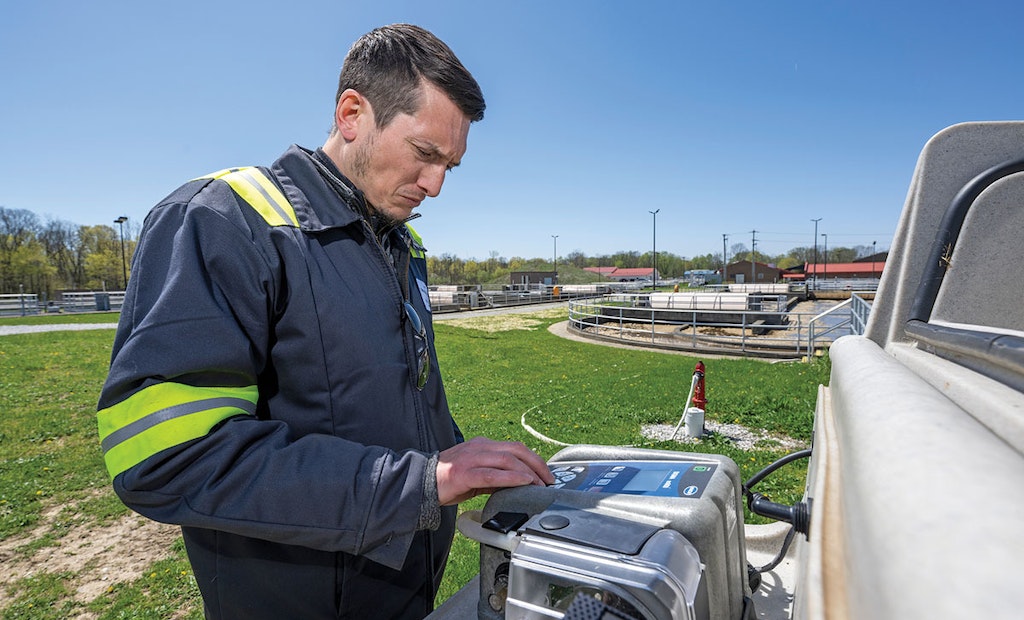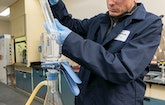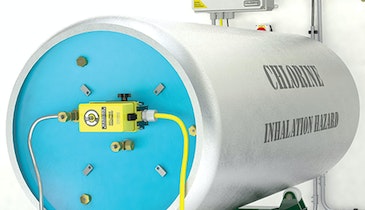
Gormon, shown with a Hach SD900 automated sampler, believes it’s good for consistency to have the same person always collecting the samples.
Interested in Laboratory?
Get Laboratory articles, news and videos right in your inbox! Sign up now.
Laboratory + Get AlertsDerek Gormon never planned for a career in the clean-water industry. Still, he’s not surprised to find himself as the manager of the laboratory at a wastewater treatment plant.
“I always gravitated toward the science fields,” Gormon says. “I’ve always been a big outdoorsy person, fairly conscious of the environment, even as a kid growing up. A lot of those things steered me toward that throughout college, and then the wastewater treatment plant job just kind of happened.
“I was working for a laboratory that did industrial fluids testing, and the wastewater job came open at a really good time. It was a different step in my career, and I wanted to focus more specifically on the environmental field.”
Gormon is the laboratory manager for the Brownsburg (Indiana) Wastewater Treatment Plant, and in 2022 he was named Laboratory Manager of the Year by the Indiana Water Environment Association.
Winding road
His career path wasn’t exactly a straight line. After graduating from high school in Mooresville, Indiana, he worked for a year in an auto parts factory before enrolling at the University of Indianapolis.
He studied for part of a year in Spain under a program from St. Louis University before returning to Indiana and enrolling at Indiana University-Purdue University, Indianapolis and studying environmental science. He found a job in his field before graduating, so he left school a few classes short of a bachelor’s degree.
With the industrial testing company, he ran lab tests on fluids from a variety of machines.
“Testing those fluids is kind of like testing human blood,” he says. “You can tell a lot about what’s going on with machinery just by testing a lot of the fluids.” After eight years, in 2018, he took his current job in Brownsburg, a city of 30,000 just west of Indianapolis.
Gormon had a couple of mentors, Charles Akers and Carrie Arnold, when he was working in the industrial fluids field, and he credits Kathy Dillon, the Brownsburg director of water utilities, as a mentor who taught him the ins and outs of operating a wastewater lab: “She has taught me a lot. I talk to her pretty much on a daily basis.”
The Brownsburg treatment plant (12 mgd design, 5.25 mgd average) uses an activated sludge process. Its customers include a large industrial bakery. Gormon’s lab regularly tests samples from the bakery’s waste stream, but the bakery has its own pretreatment system and also contracts with a third party for independent testing.
A one-person lab
Gormon works solo in the lab. “There is just enough testing and administrative work that it works pretty well with one person,” he says. “Some days, a lab assistant would be nice, but it’s not really warranted yet for the amount of testing we do.”
That means Gormon typically goes out into the treatment plant to collect samples. That’s fine with him: He thinks it’s good for data consistency if the same person collects the samples. He samples and tests numerous places in the plant once a day for regulatory compliance and process control. In the lab he uses a variety on instruments including a pH meter (Hach), a dissolved oxygen meter (Hach), incubators (Thermo Fisher Scientific) and a spectrometer (Hach).
Operators use the test results to adjust aeration and wasting rates. The dried biosolids the plant produces are sampled and tested quarterly for metals, PCBs and coliform bacteria to make sure that the material is suitable for land application. All test results are kept in a database.
“We record a lot of weather information as well to go into our monthly reports,” Gormon says. “Keeping track of that along with test data gives a good explanation of what might be happening. For example, when we get rain or big heavy snow, we’ll definitely see a change in our results; same with a rise or lowering of temperatures.
“From a data perspective, it’s always important to see any kind of a change. It’s the same thing with the operators. It goes hand in hand for both of us to investigate what’s going on. After a number of years of data, you can really get into your control charts and you can find the optimal ways of running your plant.”
Anomalous days
On most days all the test results are within expected ranges, but Gormon remembers one day when some outcomes were off the normal charts: “I was doing some ammonia testing and was coming up with some really odd results. It was just on our actual samples at first, and then our quality control samples and spike samples were showing issues as well.”
When the control samples also produced odd results, Gormon suspected a problem in the tests, not in the treatment process. “We went back and investigated and found out that we had a lot of bad vials in the testing kits that we had ordered,” he recalls. “Every once in a while, you’ll get that. They’re mass-produced, so you can get a bad batch or a bad box. That was not a fun day trying to chase that down.”
Gormon suspects the problem likely was improper storage somewhere along the supply chain:
“We use testing kits that already have freeze-dried reagents in them. If those aren’t stored correctly, say by the manufacturer or during shipping, you can definitely risk having issues.”
He documented that the test kits were the problem by running tests on standard samples.
Problem on wings
Although Gormon spends most of his work days inside the laboratory, he gets out around the treatment plant to take samples. That can be hazardous in an unusual way: The plant has a seasonal problem with geese, which can be aggressive especially when they are nesting.
“They love to set up shop in different places of the plant,” Gormon says. “We’ve had to chase quite a few of them out of our clarifiers. Sometimes they like to lay their eggs everywhere, and then you get attacked by geese when you’re trying to do checks or take samples. That’s one of the more comical things around here. They’ve even been known to attack the vehicles.”
The geese also make a mess in the parking lots. “Mostly they’re just around and being a nuisance, but some have actually died and we’ve found them in pumps. It doesn’t happen very often, but it has happened on occasion since I’ve been here.”
Looking ahead
Now that he has a few years of experience in the clean-water industry, Gormon finds that it suits him. He likes the work more than he liked testing industrial fluids: “It’s very different. I do enjoy it a little bit more from a science standpoint. You get into a lot of the life sciences and biological activity of water. It’s very interesting how it all ties together.”
His near-term plans include going back to school for the few classes he needs to complete a bachelor’s degree in environmental science. He also plans to get a wastewater laboratory analyst certification. Longer-term, he has thought about operating his own laboratory business or being a laboratory auditor.
“I definitely like the overall operations side of the laboratory and the quality-control side,” he says. “So I’d like to further my career in that direction.”
Gormon has met many people who greatly enjoy working in wastewater; some like the industry so much that they would never leave it. Still, he doesn’t think any of them grew up hoping for a job at a wastewater treatment plant. Now, he has become one of those people.
“I consider myself an environmental type person,” he says. “I definitely get satisfaction out of doing something good for a bigger cause. And then I have always been a lab rat.”








